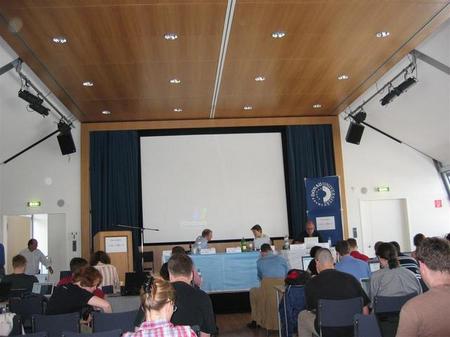| Blogtalk, Day 2 | 2004-07-07 15:45 2 comments |
 by Flemming Funch by Flemming FunchI'm back from Blogtalk in Vienna. But let me just comment a bit on the second day. It is really too much to just listen to people talking for two days, so it is a bit of a blur on the second day. Would be much better with interactive parts in-between. Not just asking questions, but being able to have more of a dialogue amongst the participants. But the backchannel chat and wiki, etc., make it a good deal more bearable, at least for the audience. Not for the presenters, who are looking at several rows of people glued to their screens, making it hard for them to know if people are paying attention. Anyway, the most valuable parts are probably the breaks and meals and what one talks about over beer afterwards. Mena and Ben Trott, creators of the Movable Type blogging software spoke first. Mostly on how they're moving in the direction of better supporting more private or small scale bloggers, who might not be looking towards attracting many strangers as readers, but who maybe are just trying to share family pictures and stories. A surprisingly large number of people configure their blogs so that they either are password protected or at least not being picked up by search engines. Peter Praschl compared blogging with jam sessions. You know, when it works well, various kinds of improvisation come together in a pleasing manner. Several speakers, like Horst Prillinger and Jane Perrone (who does a blog about blogs for The Guardian) talked about the relationship between blogging and journalism. Various people have otherwise put out the idea that blogging is essentially journalism. But now we hear that it really isn't. Journalists have to adhere to certain standards. They have to get multiple sources, verify the validity of their data, and try to be objective. And they'll usually have to try to write what people want to read. Where blogging really is the other way around. You write what YOU feel like writing, and there's no requirement to be objective or to double-check things. OK, if you really write something false, you'll usually hear about it. But many stories that spread around the blogosphere come from just one little unverified rumor posted somewhere, and then repeated over and over. Can't really call that journalism. It is more about attention. Showing what you have your attention on, and possibly feeding off of what other people have attention on. Lee Bryant of Headshift gave a very impressive overview of a knowledge community project he's spearheading. Notes and slides here. Using blogs and syndication and aggregators widely in a bigger well-integrated whole. Everything is syndicated (has a feed) and everything can be aggregated (can be read in a uniform manner). I.e. you can use uniform tools for keeping an eye on a whole range of activities, people, projects, groups, etc., and sharing information about them. I'd like to study more what he's doing, as it sounded very right. There were a bunch more speakers, but I'm not really an objective note taker, so I'm sticking with the ones that were sticking out the most for me. Collaborative notes from a group of participants are here. And postings from a bunch of other participants are still showing up at TopicExchange. |